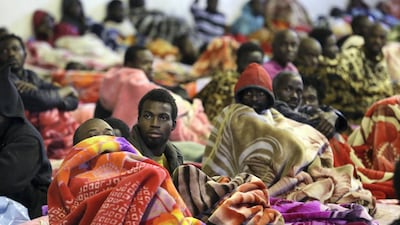The appalling circumstances being endured by refugees in Libya symbolise the ambivalent attitude of the global community towards those who are obliged to risk all in the desperate pursuit of a better life for themselves and their children. A 22-year-old Eritrean man is reported to be the latest refugee to perish in Libya's Zintan migrant detention centre. Victims of horrific conditions, including a lack of food and medical treatment, their deaths are a stain on humanity's conscience. Libya, tantalisingly close to Italy and the lure of a new life in Europe, has become the embarkation point of choice for tens of thousands of migrants, chiefly from Sudan, Nigeria and Eritrea.
Each one is fleeing in desperation, from violence or economic hopelessness. No one, as the UNHCR repeatedly reminds the world, chooses to be a refugee. But Europe does not want them and the contorted lengths to which it has gone to keep them away, while continuing to pay lip service to the notion of humanitarianism, have created a ghastly moral quandary. The EU prefers to frame the £160 million it has so far paid the Libyan coastguard as a contribution towards the protection and rescue of the thousands of migrants who risk their lives crossing the Mediterranean.
The UN refugee agency comes closer to the truth. Its latest report from Libya reveals that as of Thursday the Libyan Coast Guard has so far this year "rescued/intercepted" 14,156 refugees. "Intercepted" is a telling word. Many have died attempting the crossing. Spared that fate, many more now face a living hell in a dangerously unstable state, from which only a tiny fraction have been returned to their country of origin under EU schemes. Held in inhumane conditions in camps run by Libya's Department for Combating Illegal Migration, but largely funded by the European nations, refugees are, in the words of Amnesty International, "being sent into forced labour, tortured, raped and even beaten to death". Instead of intervening, Europe continues to aid and abet the perpetrators. The EU is not responsible for the refugee crisis that is causing so much social and political turmoil within its borders. But it cannot continue to turn a blind eye to the consequences of its response.

